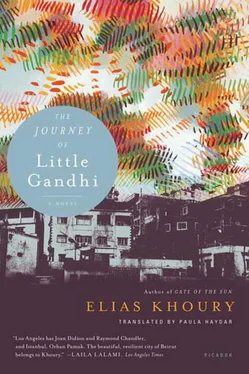Rima was afraid. When Ralph came and told her, she didn’t believe him. Then she started throwing up. His eyes bulged and there was a razor-sharp coldness in his voice. He said he’d killed the woman, and he wanted to marry her. “Now I can marry you.”
He followed her to the bathroom, where she stood in front of the sink, vomiting. He embraced her from behind, as though he wanted to make love to her. Everything in her insides flowed over as he held her waist, forcing her toward him. Then he collapsed onto the toilet and sat motionless. She left the bathroom and went into her bedroom, and heard her mother’s voice, in German, asking her what was going on. Then Ralph followed her to her bedroom, sprawled out onto the floor, and fell asleep.
Rima couldn’t believe he’d killed Madame Nuha. He didn’t tell anyone he killed her. He told his father he came home and found her dead. He said he left the house key inside, went out, and shut the door behind him, but he didn’t know anything.
“Let’s call an ambulance,” Gandhi said.
“No, no. She’s already dead,” said Husn.
Gandhi didn’t say a word. He knew it was his son who’d committed the murder, but he didn’t ask. Then Husn went out. He yelled to him, and this time he called him “Husn,” and his son answered. He came back, sat down, and lit a cigarette, but Gandhi didn’t ask him anything. When they broke down the door to his house, after the neighbors began smelling the stench of the rotting corpse, they saw Madame Nuha Aoun with torn clothes, her body bloated, and her three cats around her, also dead. Everything in the house was locked — the doors, the windows, the shutters — and the woman was there on the floor, and the three cats, dead. They took her to the hospital for an autopsy before burying her. No one attended the funeral. The Reverend Amin was there, all alone, muttering prayers and fearing this kind of end. Everyone said Husn was the murderer, but comrade Abu Karim put his mind at ease. He said don’t worry about it, “She has no relatives, and no one’s going to ask about her.” But Rima became fearful of Ralph. He told her not to call him Ralph ever again, that his name was now Ghassan, and she should call him Ghassan, and so she did. When she slept with him, she’d get that sour feeling that gnashed at her insides, precisely the way she felt when she slept with Abu Abd al-Kurdi, the concierge of the building where Hassan lived. She didn’t choose to sleep with him; it had never crossed her mind. She was on her way out from Hassan’s house, going down the dark stairs from the third floor, where he lived. There was no electricity and Rima hadn’t lit a match. As she went down the stairs, in the dark, she felt as though she were swimming in a swamp, with bugs swarming all around her. She saw him, she saw his swaying shadow. He was climbing the stairs carrying a long white candle, his shadow swayed past the stairs, giving the impression he was falling to the ground. He reached out as if to stop her, and Rima bumped into his arm, nearly falling down. He grabbed her by her waist with his outstretched hand and pulled her toward him. Rima didn’t say anything. She remembers that she said no, she said tomorrow, but he didn’t say anything. He rammed her with his head and forced her to the ground. Rima fell on the stairs, and there he took her. He didn’t take off his pants, he entered her with all his clothes on, after lifting her short skirt. Everything happened quickly, and Rima felt that sourness rise to her throat. He got off of her, pants and all, walked away, and left her on the stairs, as though he hadn’t done anything, and continued up the stairs. After that, every time Rima went down the stairs, it seemed as though she were waiting for him, and she actually was. With him she felt free, she felt she could liberate herself from this Hassan whom she visited on a daily basis. Then, when she got to know Ralph, or Ghassan, or Husn, she stopped going to him. She decided to end her story with Abu Abd, and with that silent staircase, where she’d seen herself lonely in Beirut’s long nights. There was a bit of pain and ecstasy exploding within her as she staggered between a feeling of disgust with her body and that feeling of fire sprouting in her eyes. But Husn was different, strange.
Alice told Gandhi she didn’t understand men.
Gandhi was walking alone, with sadness all around him, when he met Alice just as she was about to enter the nightclub.
She told him she didn’t understand men.
He was trying to tell her how disappointed he was with his son. Why wouldn’t he marry Rima and end his relationship with Nuha Aoun?
Alice was trying to talk to him about men. And Gandhi knew too well. When he worked at Salim Abu Ayoun’s restaurant in Beirut, he realized that life was full of secrets. The owner of the restaurant had died and left all the work to his wife. Najat, or Um Hasan, ran everything. It was a small restaurant at the end of Abu Talib Lane. It was there that Gandhi discovered the secret. This was what he told his wife the morning after they were married. He told her women were different. But his wife didn’t complain as Um Hasan always did. Gandhi did everything in the restaurant. He fried potatoes and eggplant, washed dishes, peeled onions and garlic, and slept there. He agreed to work for her because she gave him a place to sleep in a little attic above the restaurant. But he discovered that she only wanted him to sleep there in order to keep an eye on the place. Every night after he finished working, she’d prepare a special meal, take a bottle of arak, climb up to the attic, and tell Gandhi to stay downstairs.
“If anyone comes, tell them there’s no one here, we’re closed. Got it?”
“Got it, Ma’am,” Gandhi would say, looking down at the floor, because he was too shy to look that woman in the eye.
Then Mr. Spiro would come. Gandhi called him Spiro with the hat, because he never took off his blue beret, in order not to show his bald head. Mr. Spiro would come, go up to the attic, and downstairs Gandhi would sit, glued to his chair, listening to their sighs and moans.
Um Hasan would ask him to do the mopping when Spiro came. Gandhi would roll up the bottoms of his pants, put the chairs up on the tables, and mop. Then, when the sounds would start, he’d feel as though his back would break in two. He’d lean up against the wall and listen, imagining the scene as he pleased, Um Hasan’s large breasts between Mr. Spiro’s hands, Spiro’s bald head under her breasts, twinkling with sweat. And he’d remember his father’s Gypsy wife and the sting of his stick against his face, back, and thighs. He’d lean against the wall holding the world between his hands and groaning loudly. But Um Hasan wouldn’t hear him, and Spiro was nonexistent, high in ecstasy, deaf to everything.
Little Gandhi would go on mopping the floors as he watched Spiro leave. Then Um Hasan would come downstairs without looking at him. She’d glance aside as if she were saying good-bye. Then the darkness of the streets would swallow her up, leaving Gandhi all alone to wash the empty plates that had been piled beside his bed, and he’d sleep on the odor of Spiro’s sweat, Um Hasan’s perfume, his own sighs buried in the silence of drowsiness.
Little Gandhi was afraid of this man Spiro. He owned a bicycle rental shop and Gandhi didn’t like bike riding. He’d heard that Spiro had some dubious relationships with the kids who rented bikes from his shop. And that day, when Little Gandhi was put in charge of cleaning the streets in the quarter, he saw Mr. Spiro, hardly able to walk, his grandson Nabil walking beside him.
The Reverend Amin said that Spiro almost collapsed when his son, a graduate of AUB and an employee in an advertising agency, refused to name his son Spiro after his grandfather.
Читать дальше












